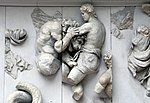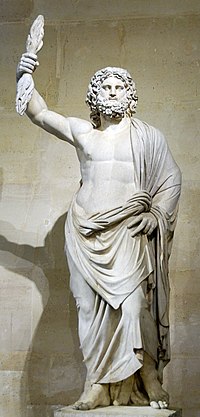The Theogony (Greek: Θεογονία, Theogonía, i.e. "the genealogy or birth of the gods") is a poem by Hesiod (8th–7th century BC) describing the origins and...
70 KB (5,944 words) - 22:17, 22 August 2024
Nyx (section An ancient theogony?)
"Night") is the goddess and personification of the night. In Hesiod's Theogony, she is the offspring of Chaos, and the mother of Aether and Hemera (Day)...
100 KB (10,984 words) - 11:22, 5 November 2024
Orphism (religion) (redirect from Eudemian Theogony)
re-interpretation or re-reading of the myth of Dionysus and a re-ordering of Hesiod's Theogony, based in part on pre-Socratic philosophy. The suffering and death of the...
34 KB (4,004 words) - 07:37, 29 October 2024
Aether (mythology) (section Derveni Theogony)
Chronos (Time), and the brother of Chaos and Erebus. According to Hesiod's Theogony, which contained the "standard" Greek genealogy of the gods, Aether was...
32 KB (3,308 words) - 00:59, 29 October 2024
ὁ Τῑτᾱ́ν, -ήν, ho Tītân) were the pre-Olympian gods. According to the Theogony of Hesiod, they were the twelve children of the primordial parents Uranus...
85 KB (9,264 words) - 01:45, 7 November 2024
Fabulae Theogony 1–2 (Smith and Trzaskoma, p. 95). Hard, p. 24; Gantz, p. 10; Hesiod Theogony 126–128. Hesiod, Theogony 132–153. Hesiod, Theogony 154–155...
41 KB (4,146 words) - 18:12, 28 October 2024
by whom the Iliad states that he fathered Aphrodite. According to the Theogony, Zeus's first wife was Metis, by whom he had Athena. Zeus was also infamous...
203 KB (17,367 words) - 13:47, 5 November 2024
Hecatoncheires (section The Theogony)
was probably formed from the Greek βριαρός meaning "strong". Hesiod's Theogony also calls him "Obriareus". The name Gyges is possibly related to the mythical...
82 KB (9,057 words) - 04:17, 25 October 2024
instead personifications of places or abstract concepts. Hesiod, in his Theogony, considers the first beings (after Chaos) to be Erebus, Gaia, Tartarus...
22 KB (2,348 words) - 02:14, 4 October 2024









